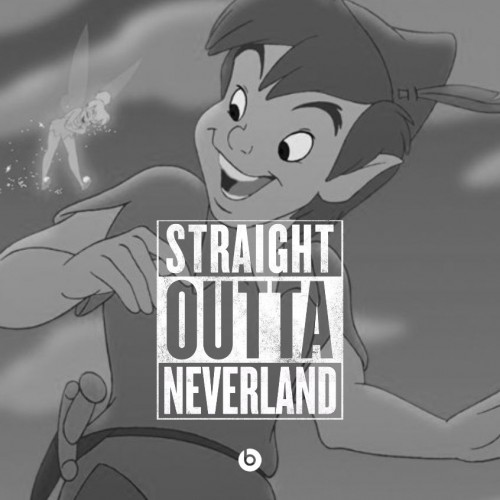 I think every young filmmaker has a handful of dream projects in their back pocket. Not only dozens of original ideas but also ones based on preexisting content: an adaptation of a novel or comic book, someone’s life story, a sequel to a beloved franchise, a tale from history, a (gasp) remake of a classic film. Projects filed away under the “When I make it big, I’ll use that clout to get one of these things made” category. Some of these projects you are sure will rock the box office; others, that you don’t really think will make any money but, if all goes well, will net you some critical acclaim.
I think every young filmmaker has a handful of dream projects in their back pocket. Not only dozens of original ideas but also ones based on preexisting content: an adaptation of a novel or comic book, someone’s life story, a sequel to a beloved franchise, a tale from history, a (gasp) remake of a classic film. Projects filed away under the “When I make it big, I’ll use that clout to get one of these things made” category. Some of these projects you are sure will rock the box office; others, that you don’t really think will make any money but, if all goes well, will net you some critical acclaim.
The two big dream projects for me could not have been more different in tone and subject matter:
I wanted to do a live-action, semi-serious, sticking-to-the-book version of JM Barrie’s Peter and Wendy…
…and a biopic about Eazy-E and the creation and dissolution of legendary hip-hop group N.W.A.
And they both got made.
But not by me.
It’s weird seeing these films come to fruition; it’s even weirder watching them. You can’t help but think about what you would have done differently, what they did better than you, what they fucked up entirely. It’s not a crushing feeling; I never got close to making either one a reality. But it’s… strange.
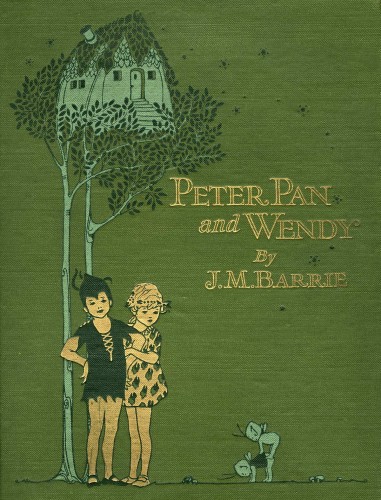 What attracted me to JM Barrie’s 1911 novel Peter and Wendy was that it was a version of Peter Pan I had never seen, knowing only the Disney interpretation. The book was darker than the animated film. More violent. More powerful. With a bittersweet message about childhood, both celebrating it and recognizing our need to shed it. Peter himself was full of contradictions: he was charming, fun-loving, sometimes feminist (“Wendy, one girl is more use than twenty boys.”) optimistic and brave, but also selfish, mean, forgetful, and super-duper violent.
What attracted me to JM Barrie’s 1911 novel Peter and Wendy was that it was a version of Peter Pan I had never seen, knowing only the Disney interpretation. The book was darker than the animated film. More violent. More powerful. With a bittersweet message about childhood, both celebrating it and recognizing our need to shed it. Peter himself was full of contradictions: he was charming, fun-loving, sometimes feminist (“Wendy, one girl is more use than twenty boys.”) optimistic and brave, but also selfish, mean, forgetful, and super-duper violent.
Which all made sense to me. Little boys are terrors. When I was a child, I may have used a stick or wooden sword to fight pirates (or Darth Vader. Let’s be honest here.) but I was imagining a real blade. I wasn’t knocking people over. I was running them through. Cutting off their heads. Killing bad guys. In Barrie’s novel, that’s what Peter does. He kills bad guys. It’s not the bloodless, G-rated action of the Disney film.
The novel has several other dark tropes that few Peter Pan adaptations have yet to explore. Peter’s role as an Angel of Death, tasked with holding children’s hands on their way to heaven. His hatred of adults, parents especially, and how he genuinely wanted them dead. The slaughter of the Indians, an aspect of the story that I admit feels racist here in the 21st Century. And the famous Peter Pan quote, when stranded on an island left to die, a line that has forever stuck with me as probably the most positive outlook on death I’ve ever heard:
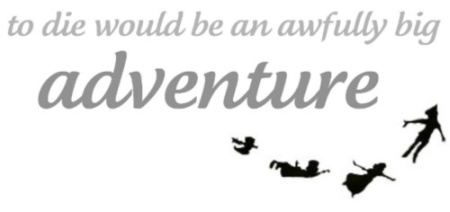 And then there’s the end. I’m not going to get into it, but the last chapter of Peter and Wendy is sad and beautiful and a real reminder that Pan is a boy who will NEVER grow up. Which is the main reason why I hate Spielberg’s Hook. I know it’s beloved by the generation after me, and that’s fine, but it’s a bad film, hands down, my Peter Pan purist proclivities aside. But more than anything: Pan doesn’t grow up. He isn’t a child. He’s a demigod, an angel, an imp, maybe even a devil. He will live forever, as the final lines of the novel tell us:
And then there’s the end. I’m not going to get into it, but the last chapter of Peter and Wendy is sad and beautiful and a real reminder that Pan is a boy who will NEVER grow up. Which is the main reason why I hate Spielberg’s Hook. I know it’s beloved by the generation after me, and that’s fine, but it’s a bad film, hands down, my Peter Pan purist proclivities aside. But more than anything: Pan doesn’t grow up. He isn’t a child. He’s a demigod, an angel, an imp, maybe even a devil. He will live forever, as the final lines of the novel tell us:
“When Margaret grows up she will have a daughter, who is to be Peter’s mother in turn; and thus it will go on, so long as children are gay and innocent and heartless.”
Gay and innocent and heartless. That is Peter Pan to me. I have yet to see him on screen.
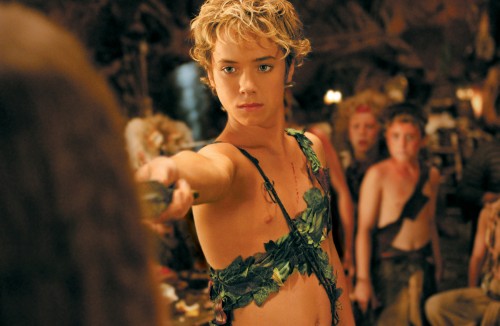 I’m not going to offer a full review of PJ Hogan’s 2003 adaptation, Peter Pan. I have only seen it once and did not care for it. It got a lot right, especially in the first half hour or so. But then it fell apart for me. And, while it did incorporate a little bit of the adult edge I was looking for, it didn’t go far enough. But when that film came out, I knew my chances of making a film out of Peter and Wendy had just been cut drastically. And then when it failed at the box office, it showed that maybe a big-budget Peter Pan movie wasn’t commercially viable.
I’m not going to offer a full review of PJ Hogan’s 2003 adaptation, Peter Pan. I have only seen it once and did not care for it. It got a lot right, especially in the first half hour or so. But then it fell apart for me. And, while it did incorporate a little bit of the adult edge I was looking for, it didn’t go far enough. But when that film came out, I knew my chances of making a film out of Peter and Wendy had just been cut drastically. And then when it failed at the box office, it showed that maybe a big-budget Peter Pan movie wasn’t commercially viable.
We’ll see if Joe Wright’s film, simply called Pan, will be different when it comes out this year. It’s apparently a prequel or something which we know ALWAYS bodes well, right? (see: Prometheus, The Thing, Star Wars, Hannibal Rising). But I doubt it’s the film I would have made.
And, man, the film I would have made is so good. It’s still there, in my head, scene by scene. I could still write it, legally. In 2007 the rights to the novel basically became public domain, leading to a series of disparate book series’ that I have not read. And maybe one day I will. Or maybe one day I’ll come up with a different take on one of my favorite stories, a new way to bring it to life.
In the late 80’s, when I was 13 years old, I got hold of a cassette tape I shouldn’t have. It was called Straight Outta Compton, by a band called N.W.A., which I soon learned stood for “Niggaz wit’ Attitude”. It scandalized me, excited me, educated me, and, quite frankly, scared the shit out of me. Especially the song “Fuck tha Police” and the shit storm that came with it.
The group’s frank and often gratuitous depictions of life on the street in a city I had never heard of called Compton, a place so far removed from suburban Atlanta that I couldn’t imagine ever going there, was eye-opening, sure, but it was also dirty. The non-stop assault of profanity, violence, and sex was exceptionally titillating to my white, sheltered, adolescent mind.
Just the use of the word “nigger” (or “nigga” or “niggaz”, technically), which my parents had raised me to strike from my vocabulary forever (“Forever. Forever? Forever ever. Forever ever?”), was scandalous. And, I admit, intriguing. This was a bad word used to describe black people. Why would these guys talk about themselves that way? I sort of understood it, but not really. Not for a long time. But I knew it was controversial and adult and, in the back of my brain, powerful. I just couldn’t tell you why.
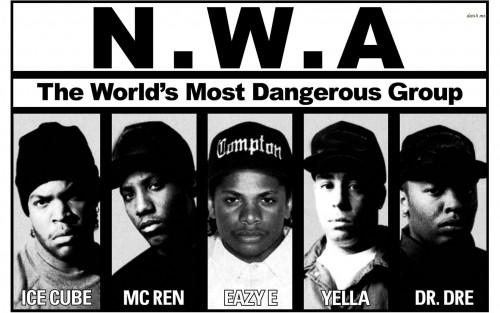 O’Shea “Ice Cube” Jackson. Lorenzo “MC Ren” Patterson. Eric “Eazy-E” Wright. Antoine “Yella” Carraby. Andre “Dr. Dre” Young. These are guys whose faces and voices I’ve known since puberty. I can recite all of Straight Outta Compton (the album, not the movie. I guess we have to differentiate now) as well is its companion piece, Eazy-E’s Eazy-Duz-It, word for word. Still, to this day.
O’Shea “Ice Cube” Jackson. Lorenzo “MC Ren” Patterson. Eric “Eazy-E” Wright. Antoine “Yella” Carraby. Andre “Dr. Dre” Young. These are guys whose faces and voices I’ve known since puberty. I can recite all of Straight Outta Compton (the album, not the movie. I guess we have to differentiate now) as well is its companion piece, Eazy-E’s Eazy-Duz-It, word for word. Still, to this day.
When (SPOILER) Eric Wright died of AIDS in 1995, it shook me. I was mostly listening to heavy metal and grunge, but I had never forgotten N.W.A. and their 5’ 5” superstar (“Niggaz [his] height don’t fight.”) . I knew the group had broken up and there had been bad blood. If you were alive in the early 90s and remember Dr. Dre’s The Chronic coming out, it was impossible not to know. But Eazy was a part of my adolescence and he was gone.
I wanted to make a movie about Eazy-E and the formation of N.W.A. I did some reading and found that there was a lot of drama to be mined. The music would be center stage, of course, but there were also political, financial, racial, sexual, and societal themes to be explored. Were these men artists pretending to be gangstas or gangstas who stumbled into being artists? I wanted to explore that question.
And, morbidly, films about actual people are more satisfying if they have a definite ending. And by that I mean death. It’s fucked up, I know, but it’s true. And the more tragic that ending, the more drama you can conjure. And (SPOILER) Eazy’s death was tragic, to be sure. He was destroyed by his own reckless behavior, sure, but dying of AIDS made Wright an icon of the 1980s. He not only helped birth a style of music that rules the airwaves over 25 years later, but he was struck down by the 20th Century’s Black Death, just at the point where we were starting to understand it. As Eazy said, from his hospital bed, after being told he had AIDS: “But I ain’t no fag.” That was the attitude then. For a lot of people.
I tried to pitch this movie to anyone who would listen. Every one of my L.A. friends knew about it. But I was never able to get through any doors of consequence. People I did get to talk to weren’t interested. Plus, there was the matter of clearing the music, an incredibly expensive process that meant the film could never be made independently. I still held out hope for 15 years. Just like with Peter and Wendy, I had the whole movie in my head and “damn, that shit was dope!”
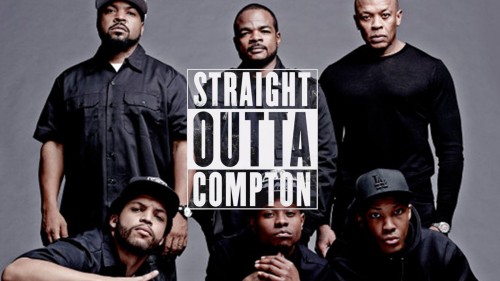 Right now, for the second straight week, F. Gary Gray’s film, Straight Outta Compton, is on top of the box office charts. I was both excited and nervous to go see it. I mean, the subject matter is obviously attractive to me, but, motherfucker, I wanted to make this movie. And I was weary that the film was produced by Dr. Dre and Ice Cube. That meant that rough corners were going to be sanded down. Certain less-than-flattering things would be omitted. I was especially worried about how the film would depict Eazy, who would have been my protagonist.
Right now, for the second straight week, F. Gary Gray’s film, Straight Outta Compton, is on top of the box office charts. I was both excited and nervous to go see it. I mean, the subject matter is obviously attractive to me, but, motherfucker, I wanted to make this movie. And I was weary that the film was produced by Dr. Dre and Ice Cube. That meant that rough corners were going to be sanded down. Certain less-than-flattering things would be omitted. I was especially worried about how the film would depict Eazy, who would have been my protagonist.
I really liked the movie.
It’s odd. It’s not at all the movie I would have made but it’s also exactly the movie I would have made. It doesn’t look like the movie in my head. Doesn’t feel or sound or flow like it. But it covers the exact story beats I would have. Its Point A is my Point A and its point Z is my Point Z. It told the story I wanted to tell, just not in the style I wanted to tell it in.
And that’s fine. Because I liked it. And a lot of people seem to feel the same way.
(Especially after the mind-blowing clusterfuck that was the Biggie Smalls “movie”.)
I do wish it had explored a little more of the dark side of things, especially the famous incident involving Dr. Dre and Dee Barnes, an omission that is getting a lot of press over the last week. It should be in the movie. It really should. The first step to atonement is to acknowledge what you’ve done. Dre has done that in the press this week, releasing statements that seem genuine. But it would have been much more powerful to explore these themes in the film. Let it all hang out. Show your ugly side. The movie has to stand on its own and Dre’s history of domestic violence isn’t something that should be discussed in a press release.
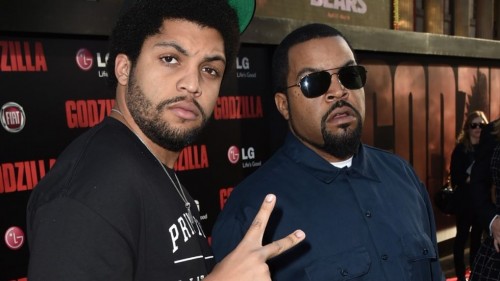 But the performances are great, especially by O’Shea Jackson Jr, who not only looks like his father but does a spot-on impression. The music is of course awesome. The cinematography interesting. The script could be better and sometimes the “bio-pic-ness” of the thing hurts it, with its need to make sure you understand who all these people coming in and out of the story are. Hey guys? I’m at a movie about N.W.A. I know that guy is playing Tupac. I am aware of his music. No need to point him out to me.
But the performances are great, especially by O’Shea Jackson Jr, who not only looks like his father but does a spot-on impression. The music is of course awesome. The cinematography interesting. The script could be better and sometimes the “bio-pic-ness” of the thing hurts it, with its need to make sure you understand who all these people coming in and out of the story are. Hey guys? I’m at a movie about N.W.A. I know that guy is playing Tupac. I am aware of his music. No need to point him out to me.
Surprisingly Eazy, the drug-dealer turned hip-hop mogul and star, comes across as the one of the biggest heart. He’s actually the soul of the movie. This makes me happy. Because that was going to be my way in, too. Through him. And when (SPOILER) Eazy dies, I was shaken, teary, even though I knew it was coming.
The only thing that pisses me off about the success of Straight Outta Compton (the movie) is… its success. It’s making BANK. All those years I was told no one wanted this movie. That it would be too expensive to get the music rights. That who cares about some gangster who died of AIDS? And now it’s ruling the Summer box office. Beating the crap out of more traditional Summer movies. I TOLD YOU, YOU MOTHERFUCKERS.
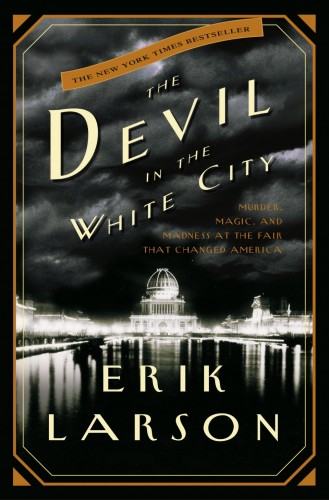 Do I have more dream projects in my head? Of course. Novels I want to adapt (not telling you which ones). Life stories I want to tell. Historical incidents I’m dying to recreate. And I will hold onto them, along with the countless original ideas I have in my head, until the next one gets knocked down by someone who got to it before me.
Do I have more dream projects in my head? Of course. Novels I want to adapt (not telling you which ones). Life stories I want to tell. Historical incidents I’m dying to recreate. And I will hold onto them, along with the countless original ideas I have in my head, until the next one gets knocked down by someone who got to it before me.
One of my favorite books, well, ever, is Erik Larsen’s Devil in the White City. I would love to make it into a movie. Recently, it has been announced that Leonardo DiCaprio will be starring in the adaptation, with our greatest living filmmaker, Martin Scorsese, behind the lens. I will defer and gladly give up that dream. Because while I think one day I could match the talents of PJ Hogan or F. Gary Gray (both accomplished, not taking anything away from them), I will never-ever come close to Mr. Scorsese. So make that movie Marty. I can’t wait to see it.
I don’t know how interesting this has been. I just had this gut reaction to seeing Straight Outta Compton (the movie) that made me sit down and write my first blog post in forever. Sitting there, watching a movie I have dreamed about a thousand times, not looking at all like the film I would have made but enjoying it all the same.
Now that I think about it, that’s probably how I’m going to feel about The Force Awakens, too, because I know I have at least 3,263,827 Star Wars movies in me.
And I’m not giving up entirely on Peter and Wendy. Some dreams die harder than others.






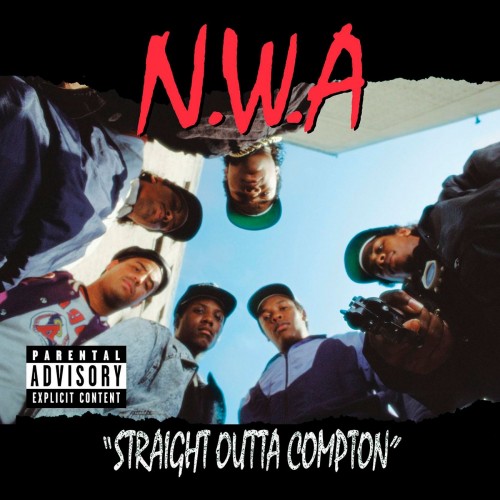
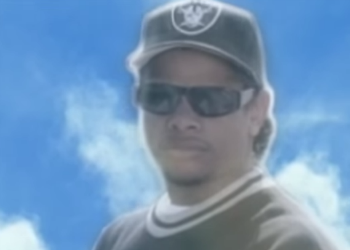
I loved this post, and the Outkast lyric drop.
I’ve yet to see the movie, and I’ll admit Dr. Dre’s history, and even the group’s history with their treatment of women both on album’s and off has me wanting to wait.
N.W.A was never a favorite of mine but you can’t deny the effect they had on rap and hip/ hop.
Welcome back Chad.